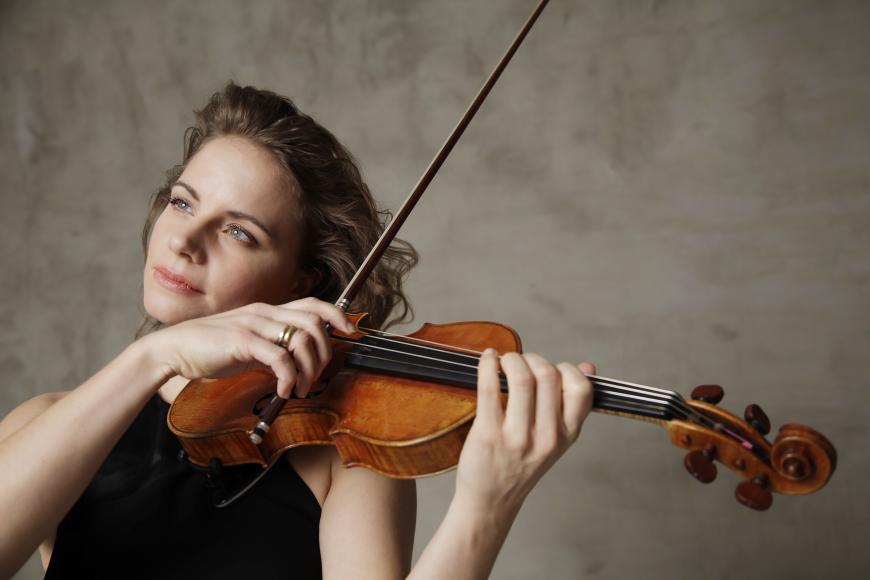
When violinist Julia Fischer returned to the stage for an encore on Friday, Feb. 23, she told the Davies Symphony Hall audience she was going to play a caprice by Niccolò Paganini but was still deciding which one. That same sense of spontaneity and immediacy permeated her fresh and absorbing account of the Brahms Violin Concerto.
With San Francisco Symphony Music Director Esa-Pekka Salonen leading a firm and judicious performance, Fischer brought lyrical eloquence, dynamic delicacy, dramatic urgency, and musing introspection to this repertory staple. A commanding technique knitted it all together, without ever drawing attention to itself, like the stitchery of a fine garment.
Dressed in a shimmering blue-green gown, Fischer waited motionless, as if collecting her thoughts, for her first entrance to arrive. When it did, she signaled that a long, singing line would be a distinguishing aspect of her approach. And so it was, through the complex, folk-inflected narrative of the opening movement. Even as the drama mounted, through a fusillade of double-stops and devilishly demanding passage work, the soloist projected a through-line of self-possession, even a kind of serenity.
That’s not to suggest she shorted any of the work’s swelling big moments or weighty exclamations. It’s just that they were all integrated into an ever-evolving, almost meditative flow. Slashing strokes gave way to the quizzical tilt of a phrase, a sudden breath-catching pianissimo, or a surpassingly sweet high note, all without ever being swamped by Brahms’s sometimes burly swagger. Fischer never struggled to be heard through the occasionally dense curtain of sound.
Left on her own in the cadenza, Fischer made a small feast of it. Where many soloists run off a reel of showmanship, here, musicianship of a higher order prevailed. Exquisitely expressed phrases, poised with and against each other, created the sense of an internal conversation, as if the violin were speaking to itself in its own unique language. It was an extraordinary, wholly original thing to witness and hear.
In the shorter concluding movements, Fischer and the orchestra maintained and developed their rich exchange. The Adagio took on a mordant, even tragic cast, the soloist lamenting even as the oboe and strings offered consolation. Even when it seemed that Fischer might have shown us all she had to offer, there were more revelations to come. In the combustive final movement, the soloist’s double-stops took on a grittier, almost caustic edge. A dark and throaty tonality emerged near the end, as if she were posing new questions in a new voice.
After breaking out a wide smile and accepting Salonen’s embrace, Fischer settled on the Paganini Caprice No. 17 for her encore. Her choice, by no means the flashiest option, seemed altogether fitting. Paganini’s two contrasting subjects recalled the inner dialogue Fischer had elicited so strikingly in the Brahms cadenza. From start to finish, the violinist left a distinctive mark.
Stravinsky’s 1920 ballet score Pulcinella opened the evening. Salonen led a glittering, vividly colored account of this neoclassical charmer, which borrows from and enriches an opera buffa score that used to be attributed to the 18th-century Italian composer Giovanni Battista Pergolesi. While the melodies may be borrowed, the orchestration is ebulliently, unmistakably Stravinskian. One delightful touch followed another, whether it was first-chair string players forming an impromptu chamber group or the woodwinds murmuring and cooing to each other in a string-free colloquy.
Salonen seemed to be having a jolly time on the podium, and for good reason. The musicians were all in. The brasses brayed. The two bassoons chortled. The horns set off on a lively hunting trip. Absent dancers and sets (the originals were by Picasso), the orchestra conjured the story’s bucolic romp through love, jealousy, and liberation. Hearing was seeing and believing.
There were three singers who were along for the ride: mezzo-soprano Sasha Cooke, tenor Nicholas Phan and bass-baritone Luca Pisaroni. While Cooke sang with her customary lustrous tone and choice delivery, only Pisaroni seemed to get into the theatrical spirit, glowering and suffering with amusing brio. At every turn, the orchestra was ready to bound back in and come to the rescue.

